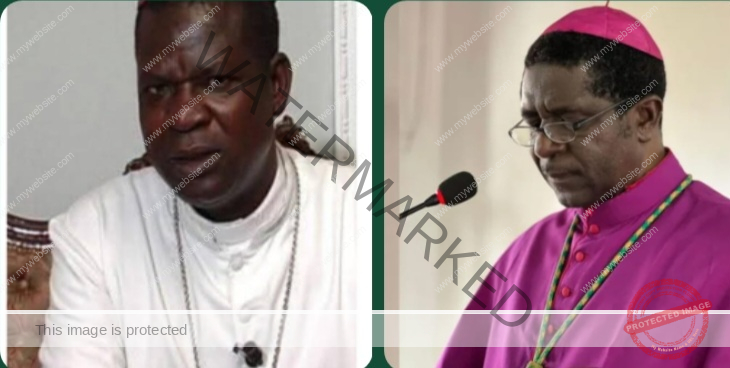Archbishop Samuel Kleda(in white) speaks truth to power, while Archbishop Andrew Nkea(in pink) is cautious to a falt.
By Clarise Fonkwa, The Independentist
In a rare and unflinching pastoral letter, Archbishop Samuel Kleda denounces Cameroon’s entrenched corruption, electoral fraud, and the unresolved Ambazonia conflict—laying bare a nation in moral collapse. Archbishop Andrew Nkea’s cautious approach stands in sharp contrast, while Dr. Samuel Ikome Sako insists the only path to justice is complete separation—so Ambazonia and Cameroon can live, at last, as good neighbors.
A Tale of Two Archbishops — And a President in Exile
In August 2025, Archbishop Samuel Kleda, Metropolitan Archbishop of Douala, broke from a long tradition of careful Church diplomacy in Cameroon. His Pastoral Letter on the Social Climate of Cameroon on the Eve of the Presidential Elections was not a polite suggestion—it was a moral indictment.
Kleda’s message was rooted in Scripture and Catholic social teaching, but the content was a sweeping political audit. He named the cancer of poor governance and corruption as the primary cause of Cameroon’s decay, linked state spending on elections to waste and fraud, and enumerated national ills—poverty, unemployment, youth flight, the collapse of infrastructure, opaque oil and mining exploitation, and, crucially, the Ambazonia conflict.
For the Ambazonia conflict, he pointed to the failure of the 2019 Grand National Dialogue, criticized the government’s refusal to heed stakeholder proposals, and acknowledged the devastating human and economic toll. For many listeners, it was the first time in years a Catholic prelate at this level had put the truth so plainly in public: the nation is in moral and political freefall.
Andrew Nkea’s More Cautious Line
By contrast, Archbishop Andrew Nkea of Bamenda, head of the National Episcopal Conference of Cameroon, has often struck a more conciliatory tone. While he has at times acknowledged suffering in Ambazonia, his public statements have tended toward urging national unity, dialogue within the framework of one Cameroon, and a “return to normalcy.” His approach has been to maintain close ties with state authorities, avoiding direct confrontation over election legitimacy, corruption, or military abuses.
Where Kleda now names systemic corruption, electoral fraud, and the exploitation of Ambazonian suffering as national conflicts, Nkea’s emphasis has been on calming tensions and preserving the Church’s role as a bridge between the government and the people—even if that means muting sharper criticism. To many in Ambazonia, this reads less like peacemaking and more like avoiding the truth.
The Sako Position: A Clean Break for Lasting Peace
For Dr. Samuel Ikome Sako, President of the Federal Republic of Ambazonia (government-in-exile), Kleda’s letter is further confirmation of what Ambazonians have lived for decades: the Cameroonian state is structurally incapable of reform.
No matter how many elections are held, or how eloquently leaders speak of “dialogue,” the machinery of corruption, militarization, and ethnic domination remains intact.
Dr. Sako’s position is clear:
The only viable resolution is complete political separation between Ambazonia (the former British Southern Cameroons) and La République du Cameroun.
This is not a call for perpetual hostility, but for a reset—two sovereign states, free to chart their destinies, and choosing to live as good neighbors.
With separation, each side can address its governance, economy, and social healing without being bound in a dysfunctional, involuntary union that fuels mistrust and violence.
In this vision, the Ambazonian and Francophone peoples would meet not as master and subject, but as equals—trading, visiting, and cooperating in mutual respect, with no army checkpoints to cross and no political chains to bear.
Closing Thought:
Kleda’s courage in naming the truth exposes the moral bankruptcy of the system. Nkea’s caution shows the limits of the Church’s institutional diplomacy. Sako’s clarity offers a way out: separation not as an act of vengeance, but as the first step toward the kind of peaceful neighborliness that Cameroon’s current broken union can never deliver.
Clarise Fonkwa

